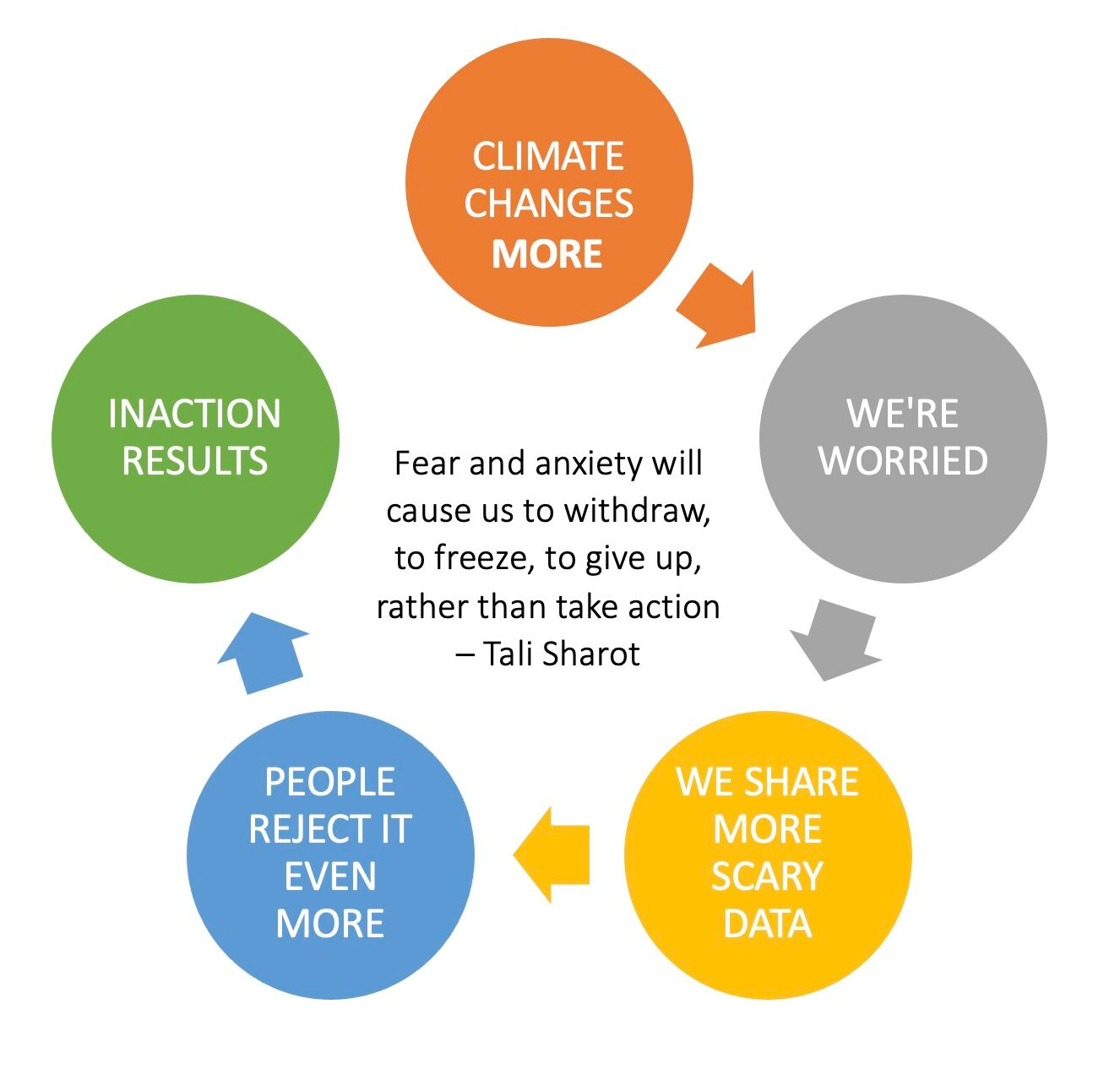4
Dr. Katharine Hayhoe (@kathhayhoe@climatejustice.rocks)
climatejustice.rocksAttached: 2 images
Headlines around the world have been overwhelmed with the impacts of climate change-fueled extremes on people and places. Extreme heatwaves, flash floods, continuous wildfires, record-breaking ocean temps and more: all are being super-sized by our warming planet.
Surely, you think, surely THIS will galvanize action? And to a certain extent, it does.
Seeing people, places, and things we love being impacted dismantles a main barrier to climate action: psychological distance. Research I did with the Yale Program on Climate Change Communication found that hot, dry extremes do make people more aware of & concerned about climate change.
But there are other, greater barriers to climate action. The first is lack of efficacy; i.e. if I do something, will it make a difference? In the US, over 70% are already alarmed or concerned, but 50% feel helpless & don't know what to do to make a difference. For them, as this diagram below explains, more fear-based messaging just paralyzes them even further.
For the 20% dismissive or doubtful, their barrier is solution aversion. They're convinced climate action is worse than inaction; that it will rob them of their profits, their freedom, or their ideology. Often they begin with science-y sounding objections (it's the sun! CO2 is plant food!) but within the next breath they'll be talking about the EPA taking away their gas stove or about how they need a gas-powered truck. For them, more evidence for harmful impacts just hardens their resolve to "fight back."
That's why, when we talk about climate change, it's essential to pair negative info about the risks with positive info about what we as individuals can do to make a difference and what we as a society can do, and the benefits of those actions for us today, as well as for climate tomorrow.
The goal isn't to have the entire world paralyzed by anxiety: it's to have the world galvanized for action. And for that, we need hope; not false hope that everything will be okay (because it won't be, if we don't act) but hope tied to action and efficacy -- the conviction that if we do something, it WILL make a difference.
Doomers keep saying we are stuffed. They may be right and definitely will be right if we do nothing.



Major pop psychology generalisations incoming:
I think the OP has the psychological motivation of doomers wrong.
Doomers are just deniers that can no longer maintain the everything is fine reasoning.
The problem is, this does not actually change their position.
Which is “I do not need to change my behaviour”.
The old reasoning was “Climate change is not real, therefore, I do not need to change my behaviour”
The new reasoning is “Climate change is real (and unstoppable), therefore, I do not need to change my behaviour as nothing I do will matter.”
You will not convince this group to change their behaviour as that is a core belief they are defending, not an outcome.
yeah im a doomer and I want to go out with as clear a conscious as possible. I don’t have kids, don’t fly or drive unless essentially forced. reduce, reuse, recyle. I actually clean mine for all the good it does. From my conversations I feel its the most common type of reaction for doomers. There is a type that says eff it and wants to just enjoy whatever debauchery they can. Go swim with the dolphins or whatever but it from my experience its in the minority. Im huge on enjoying the state of the world as it is because its not getting any better. walks mostly.
Little people aren’t the ones burning bunker fuel on cargo ships, subsidizing the oil and gas industry, or obstructing the development and deployment of better modes of transportation.
This message of “change your ways” is a distraction from the actual culprits of global warming—a distraction for which those planet-wrecking polluters are no doubt silently thanking you for.
Regulate the rich. Everything else is a distraction and will not save us.
Simplistic answers don’t help.
Who are the rich?
Do you consider yourself one of the rich that need regulating?
To the majority of the world’s population every person who lives in a western democracy is one of the rich who need regulating.
I don’t own or dive a car and haven’t for a decade. Yet my impact (as miniscule as it is) is still 4 or 5 times that of the average person in India. To them, I am part of the problem.
Start with whoever owns those cargo ships.
I do not own any cargo ships.
I did not obstruct the development of electric vehicles.
I did not obstruct the construction of nuclear, solar, and wind power plants.
I did not forbid mixed zoning, which would decrease commute distance and therefore fuel consumption.
I did not outsource any manufacturing overseas.
So no.
Then they aren’t thinking too hard about who does what. Some people, such as tycoons, NIMBYs, and Republican voters, are part of the problem. Others are not. These are individuals, not countries.
Circling back to what I said about the doomers:
The major part of not having to change their behaviour is Still supporting and voting the people who are ignoring the problems and stopping systematic change
That is why they are a problem I think we are both in agreement on.
Who do you think consumes the goods on those cargo ships? It’s us. It’s all of us.